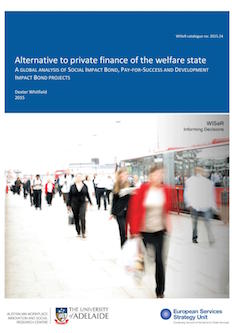ESSU Research Report No. 7: Alternative to Private Finance of the Welfare State: A global analysis of Social Impact Bond, Pay-for-Success & Development Impact Bond Projects, by Dexter Whitfield
| Investors select social needs that are profitable, but ignore needs that are not. | Address the symptoms, but not the causes of poverty and inequality. |
| Privatise the design, finance, service delivery, contract management, monitoring and evaluation of projects. | Extend markets and market forces further into the welfare state that could ultimately threaten social rights. |
| Monetizes the value of outcomes by agreeing a sum of money for each outcome. | Private and institutional investors will increasingly replace 'social investors'. |
| Make social need dependent on private markets and decrease publicly provided services. | Democratic accountability, participation and transparency are eroded by the contract culture. |
| Blur important distinctions between public, non-profit and private services. | Risks are borne by government, service users, staff and contractors, not just private investors. |
| Commodification and monetising early intervention and prevention will have a negative impact for women in social reproduction, in training and employment and will intensify gender inequality. | Creates a new source of accumulation for private investors in public services and the welfare state with annual rate of return of up to 15% - 30% or more. |
| Employees have private/non-profit sector terms and conditions, less job security and trade union representation. | Performance-based contracts lead to commercialisation of non-profit and voluntary sector organisations. |
| Private finance, alternative providers, making markets, competition, privatisation, deregulation and public grants and subsidies are the components of neoliberal public management. | A secondary market is likely to emerge to trade in social impact bond investments that could be transferred to offshore tax havens following the PFI/PPP model. |
| Do not deliver additional resources and only delays public spending when private investors are repaid with profit. | Banks and financial institutions will increase their power to shape public policies. |
| Project organisation is neoliberal innovation, but activity is rarely innovative - they apply proven methods to new population groups. | High set-up or transaction costs including a coterie of consultants, financial advisers, lawyers and evaluators. |
| Lack of evidence of savings in public spending, which are only valid if the full government cost of reconfiguring public services and infrastructure legacy costs are included. | Early intervention and prevention should be part of public sector initiatives and integrated with core services. |
| Exclusive focus on outcomes despite inputs, processes (and outputs in some cases) having a direct effect on the quality of public services. | Claims of 'social or public value' or 'public benefit' are vague and not meaningful and conceal class interests. |
| The comparison of outcomes with unimproved public service provision is fundamentally flawed and designed to exaggerate the effect of social impact bonds. | Imposes a new set of power relations between private investors, intermediary organisation, contractors, consultants, evaluator and the government or public body. |
| Exploit the most vulnerable, poorest and others dependent on public services and the welfare state. | Deliberately exclude and deny there are viable and more effective public sector alternatives. |
| Advocates make assertions about 'government failure' when market failure is the cause of financial and economic crises. | Development impact bond model threatens to impose more profiteering and privatisation in the global south. |
Source: Alternative to Private Finance of the Welfare State: A global analysis of Social Impact Bond, Pay-for-Success & Development Impact Bond Projects, Dexter Whitfield. Published jointly by the Australian Workplace Innovation and Social Research Centre, University of Adelaide and ESSU.

This document was last modified
on
2016-04-07 11:00:32.
European Services Strategy Unit, Duagh, Camp, Tralee, County Kerry, Ireland.
Copyright © 1998-2017 European Services Strategy Unit
European Services Strategy Unit, Duagh, Camp, Tralee, County Kerry, Ireland.
Copyright © 1998-2017 European Services Strategy Unit